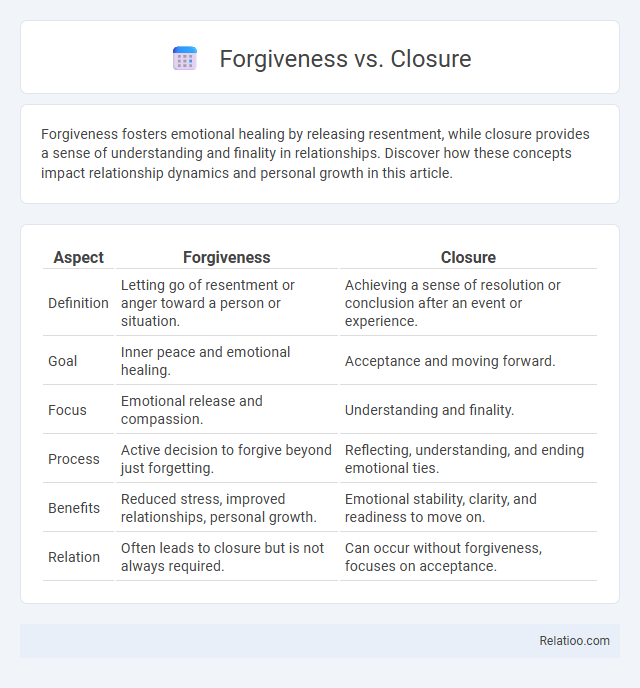Forgiveness fosters emotional healing by releasing resentment, while closure provides a sense of understanding and finality in relationships. Discover how these concepts impact relationship dynamics and personal growth in this article.
Table of Comparison
| Aspect | Forgiveness | Closure |
|---|---|---|
| Definition | Letting go of resentment or anger toward a person or situation. | Achieving a sense of resolution or conclusion after an event or experience. |
| Goal | Inner peace and emotional healing. | Acceptance and moving forward. |
| Focus | Emotional release and compassion. | Understanding and finality. |
| Process | Active decision to forgive beyond just forgetting. | Reflecting, understanding, and ending emotional ties. |
| Benefits | Reduced stress, improved relationships, personal growth. | Emotional stability, clarity, and readiness to move on. |
| Relation | Often leads to closure but is not always required. | Can occur without forgiveness, focuses on acceptance. |
Understanding Forgiveness: A Deep Dive
Understanding forgiveness involves recognizing it as a personal journey that frees you from resentment and emotional burden. Unlike closure, which often requires external validation or events to conclude a chapter, forgiveness is an internal process that fosters emotional healing and peace. Embracing forgiveness can transform your perspective, allowing you to move forward with clarity and compassion.
What is Closure? Defining the Concept
Closure is the psychological state of resolving emotional distress or uncertainty following a significant event, often related to trauma or loss. It involves reaching an internal conclusion that allows individuals to accept what happened and move forward without ongoing emotional turmoil. Unlike forgiveness, which centers on releasing resentment toward others, closure emphasizes personal acceptance and the end of emotional conflict.
Forgiveness vs Closure: Key Differences
Forgiveness involves letting go of resentment and granting compassion to yourself or others, promoting emotional healing and inner peace. Closure, on the other hand, is about finding a sense of resolution or understanding regarding a past event, often through acceptance or finality. Your emotional wellbeing improves more profoundly when you understand these differences, as forgiveness fosters ongoing peace while closure brings a definitive end to emotional distress.
Psychological Benefits of Forgiveness
Forgiveness offers profound psychological benefits by reducing stress, anxiety, and depression, fostering emotional healing and inner peace. Unlike closure, which often depends on external events, forgiveness empowers Your mind to release resentment, improving overall mental health and resilience. Embracing forgiveness encourages empathy and emotional growth, promoting healthier relationships and a more balanced emotional state.
The Role of Closure in Emotional Healing
Closure plays a crucial role in emotional healing by providing a sense of resolution and finality that allows your mind to move forward from past hurts. Unlike forgiveness, which involves releasing resentment toward others, closure centers on internal acceptance and understanding of the events that caused pain. This psychological process fosters emotional relief and empowers you to restore inner peace without necessarily reconciling with those involved.
Common Myths About Forgiveness and Closure
Forgiveness is often misunderstood as forgetting or excusing harmful behavior, while closure is mistakenly believed to require explicit apologies or confrontations. Common myths include the idea that closure guarantees emotional healing or that forgiveness means reconciliation with the offender. True forgiveness and closure focus on personal emotional release and acceptance rather than external validation or specific outcomes.
Can You Have Forgiveness Without Closure?
Forgiveness and closure represent distinct emotional processes, where forgiveness involves releasing resentment or anger towards someone who caused harm, while closure provides a sense of resolution and understanding about the situation. You can achieve forgiveness without closure, as forgiveness is an internal choice independent of receiving an explanation or acknowledgment from the other party. Many psychological studies highlight that true forgiveness primarily benefits your mental health, even when closure remains unattainable.
Strategies for Seeking Forgiveness and Closure
Effective strategies for seeking forgiveness and closure involve open communication and self-reflection, enabling you to express genuine remorse and understand the underlying emotions. Prioritizing empathy and active listening helps rebuild trust while fostering emotional healing. Establishing clear boundaries and setting realistic expectations supports a healthy resolution and personal growth.
When Forgiveness or Closure May Not Be Possible
When forgiveness or closure may not be possible, emotional healing requires different strategies such as acceptance and self-compassion. You might find that unresolved trauma or ongoing conflict prevents full reconciliation or a definitive conclusion, making personal growth and boundary-setting essential for moving forward. Understanding the limitations of forgiveness and closure allows you to prioritize mental well-being without forcing emotional outcomes.
Moving Forward: Choosing the Path That Heals
Forgiveness, closure, and moving forward each play distinct roles in your healing journey, with forgiveness releasing resentment and closure providing a sense of resolution. Choosing the path that heals involves understanding that moving forward is not about forgetting the past but embracing growth and peace. Your ability to prioritize emotional well-being guides you toward a future unmarred by pain and anchored in strength.

Infographic: Forgiveness vs Closure
 relatioo.com
relatioo.com